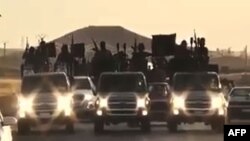Even as U.S. officials highlight military gains against the Islamic State terror group in Iraq and Syria, there is a growing sense of unease among former officials and analysts that the current strategies are not enough.
Their fear is that while the U.S. and its coalition partners are degrading Islamic State's abilities on the battlefield, planners have yet to hit upon any coherent strategy to stem the tide of young people who are willing to fight and die in the name of Islamist extremism.
"The threat of violent extremism is growing, casting its shadow over ever larger parts of the globe," former British Prime Minister Tony Blair warned an audience Tuesday in Washington.
"How do we defeat something that is plainly much bigger and more pervasive than the small number of those attracted to groups like Daesh?" he said. "There is a justified anxiety."
Blair is joining a growing list of former officials trying to find answers and, along with Leon Panetta, a former CIA director and U.S. defense secretary, is co-chairing the Washington-based Center for Strategic and International Studies' newly launched Commission on Countering Violent Extremism.
The commission's goal is to provide Western policymakers with a "strong, clear and realistic" plan by July to combat the growing threat.
Muslim identity crisis
Blair said Tuesday that while a military component is critical, he believes what has been lacking is a way to undercut the ideology that allows violent extremists to thrive.
"It has, unfortunately, a reach way beyond the activities of a few fanatics measured in the tens of thousands. The ideology, or at least significant parts of it, are accepted by those measured in the tens of millions," he said.
"Some of those people actually oppose violence, but that worldview is, in my view, the soil in which the violence breeds," the former British Prime minister added.
Complicating matters further is the success Islamist extremist groups, and especially Islamic State, have had in tapping into Muslim youths who feel isolated and disenfranchised, whether living in Muslim-majority countries or in the West.
"Muslim millennials are facing a crisis of identity," said Farah Pandith, a former special representative to Muslim communities who is now with the Council on Foreign Relations.
"They are seeking answers about navigating their identity and they're getting those answers from Shaikh Google," she said.
For its part, U.S. officials say they have long cautioned that the effort to defeat Islamist extremist groups like IS would be long and complicated.
"This administration recognizes that the threat posed by violent extremism extends far beyond any one region and it's not going to be addressed solely — or even primarily — by military means," U.S. Secretary of State John Kerry told lawmakers Tuesday. "The approach that we've adopted is comprehensive and it's long term."
Alberto Pimienta contributed to this report.





